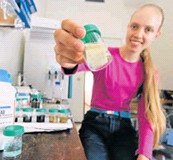
MODIFICATIONS to a cheap and simple home test kit made from basic school science laboratory chemicals and everyday household items could help improve South African tap water quality.
Experts say the idiot-proof kit, which cost Rhodes University’s pharmacy department R5 to make, is a good early warning system that does not require fancy laboratories or sophisticated equipment to establish whether water is contaminated by faecal bacteria and other nasties like salmonella.
Doctoral student Catherine Luyt, who modified the kits and piloted student tests in Grahamstown, said Hydrogen Sulphide (H2S) strip testing was an inexpensive and accurate way for local authorities and unhappy consumers to gauge water quality and pinpoint problems.
A real advantage of the kits was they could be used by “most people” – with minimum training and just a basic education.
Dr Roman Tandlich, senior lecturer in the faculty of pharmacy at Rhodes University, yesterday said tweaks by Luyt had lifted the kit technology – developed to test water quality in rural and remote areas where certified laboratories do not exist – to another level.
“The advantage of the modified kit ... is that for the first time this cheap tool has the sensitivity of the government standard methods for microbial water quality.”
He said municipalities could use the kits to monitor their water quality in places where a certified laboratory was not available.
“This allows for regular checking of the tap water samples in a municipal supply and low-cost identification of problem areas in a low-skill environment.”
The kits, made up in small containers in a simple science laboratory under sterile conditions, use a combination of household items like dishwashing liquid, tinfoil and chemicals including phosphates, sulphates and amino acids to test water quality.
Tap water poured into the tiny bottle containing the test cocktail would turn black within three days if it contained bacteria.
The kits also enable local authorities to test tap water in problem areas to pinpoint supply line breaks and gauge how widespread the contamination is.
“The idea is to roll out the kits to the people to allow them to do their own tests at home.”
Positive test kit results would, however, have to be followed up with extensive and expensive testing by an accredited laboratory.
Weekly lab tests can run into thousands of rands or more – depending on how many tests are done – making the kits a cheaper, more affordable option to try and find problem areas.
Conducted by homeowners, they also mean local authorities do not need to employ loads of highly trained staff to try and identify problem areas that need to be sorted out.
Luyt said the tests could also be used by municipalities to convince consumers their tap water was safe and as an education tool to improve sanitation practices.
While previous municipal managers had no interest in making the technology available to consumers, it is hoped acting municipal manager Thembinkhosi Myalato – who recently said municipal officials needed to work closer with Rhodes University experts to solve water problems – will give it a go.
Caption: TESTING, TESTING: Rhodes University PhD student Catherine Luyt checks up on Grahamstown water samples yesterday
Story by David Macgregor
Source: Daily Dispatch
